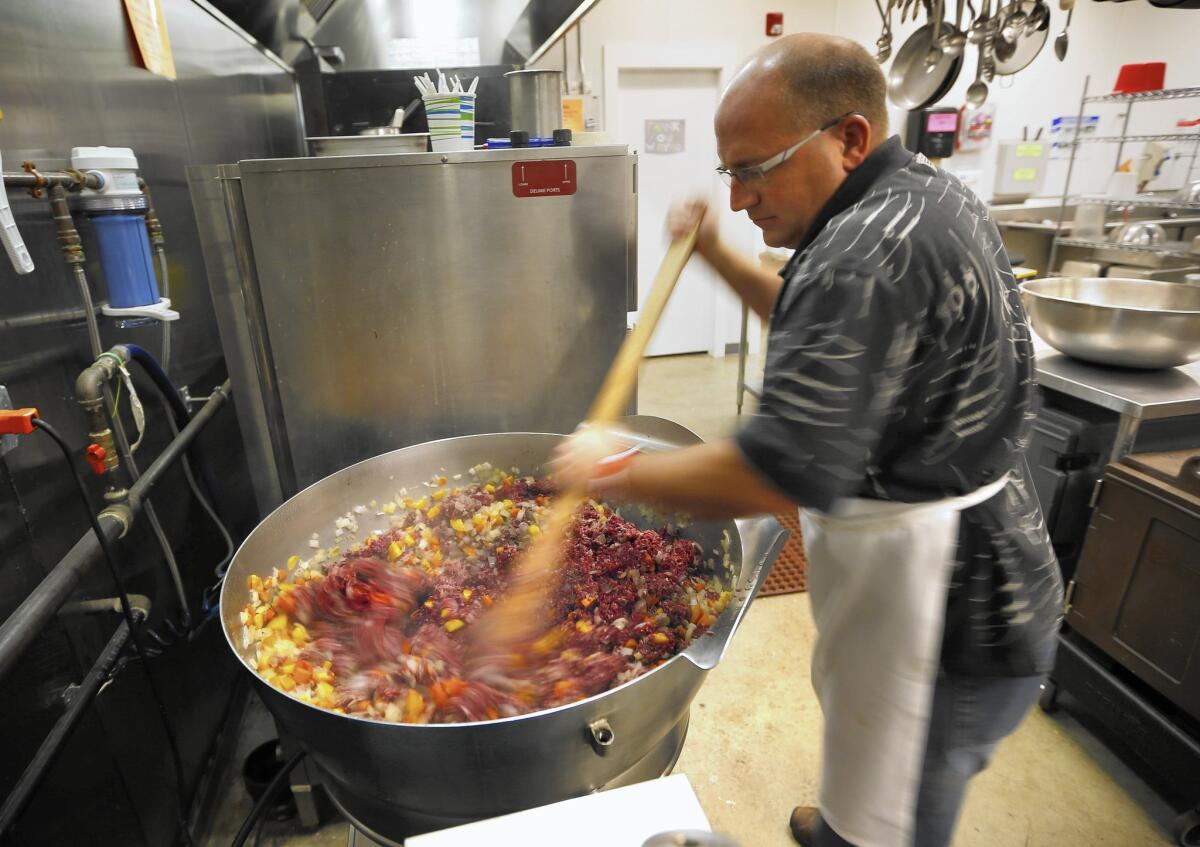A game plan: More hunters donating meat to the hungry

Don Morrison mixes venison and moose meat for shepherd’s pie for a free dinner in Portland, Maine.
- Share via
Reporting from PORTLAND, Maine — It’s a cool fall morning outside a red brick warehouse in Maine’s largest city, and Don Morrison is facing a tall order. It’s time to turn 40 pounds of moose and deer meat into enough shepherd’s pie to feed 200 people by sundown.
Morrison, manager of the Portland anti-hunger group Wayside Food Programs, is happy to do it, in part, because of the source of the meat. Tonight’s dinner was acquired through Hunters for the Hungry, a state-run program that allows hunters to donate their game. It has grown exponentially in recent years.
The amount of deer, moose and bear meat donated by hunters to food pantries, soup kitchens and homeless shelters through the program has quietly grown tenfold since its founding. The program generated about 1,000 pounds per year when it started nearly 20 years ago. It now often generates about 10,000 pounds per year, director Jason Hall said.
Game meat donation programs in general are growing steadily since the recession, now that hunters have more time and money to pursue the hobby, according to Hagerstown, Maryland-based Farmers & Hunters Feeding the Hungry, which coordinates game meat drives in several states. Donations have grown nearly 20 percent since 2008 to about 1.3 million meals last year, the organization said.
Dishes like moose sloppy joes and bear corned “beef” are a little foreign to some people, but the program has helped hunger relief agencies, Morrison said.
Thirteen-year-old Cheyennee McMahan, of Portland, sitting recently at one of Wayside’s free community meals with her mother, Vicki, described bears as “too cute” for consumption, but she was willing to give moose a try.
Vicki, a peer support worker for Catholic Charities Maine, said the family relies on the weekly meals for nutrition and to make ends meet. She said she has learned a lot about the versatility of deer and moose meat. Last year’s big hit was deer enchiladas.
“It was great — and this was the first time I’ve had it as shepherd’s pie,” McMahan said.
The Legislature created Maine’s program in 1996 as a way to find a home for potential food that might otherwise be wasted. The program costs the state $2,000 to $4,000 per year, depending on the volume of donations, but money given to the program has helped defray some of that cost, Hall said.
Hunters typically drop off their animals at one of 32 designated processors around the state, Hall said. The state then tries to match the processor with a charity in the region so the meat stays local, he said.
The uptick in interest, aided by a campaign by the state, has been noticeable, Hall said.
“Even with out-of-staters. They may have gotten a moose permit, they might be from New Jersey. They want the rack, so they will donate the 900-pound moose to us and just take the head with them,” he said.
Game meat donation programs exist all over the country, with some dating back decades. Wisconsin-based Hunt for the Hungry says on its website that it has overseen the donation of more than 700 tons of deer and other game meat in its 20 years of existence.
The programs have occasionally run afoul of health authorities, such as in Louisiana in 2013, when officials ordered the destruction of 1,600 pounds of donated venison because it wasn’t allowed in homeless shelters. Maine’s program avoids the problem by contracting with processors that are inspected by the Maine Department of Agriculture, Hall said.
Maine’s program is popular with Thin Blue Line Meats, a Rockland meat cutter that processes game animals for charity at no charge. Owner Jeff McLaughlin said he also asks every hunter if they’d like to donate a pound of their meat to Hunters for the Hungry, and most do.
“The owner of a deer just said, I’d like to keep the backstrap, make me a little sausage and donate the rest to Hunters for the Hungry,” McLaughlin said. “It’s a great program.”
Whittle writes for the Associated Press.
ALSO
Ben Carson, visiting Syrian refugees in Jordan, says he ‘saw pain on faces’
Fortune struck for these Syrian migrants, but can they make it in California?
Poland won’t extradite Roman Polanski to the U.S., ending four-decade legal saga
More to Read
Sign up for Essential California
The most important California stories and recommendations in your inbox every morning.
You may occasionally receive promotional content from the Los Angeles Times.













